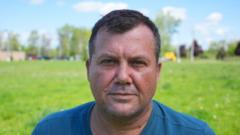Charl Kleinhaus, a 46-year-old Afrikaner farmer from Mpumalanga, South Africa, finds himself in a drastically different environment—a budget hotel along a highway in Buffalo, New York, after fleeing his homeland. His move comes in light of perceived discrimination against white farmers in South Africa, an issue that sparked principles behind the controversial actions of former U.S. President Donald Trump, who signed an executive order aimed at providing refugee status to those he deemed persecuted.
Kleinhaus recounts chilling moments that led him to leave his five-bedroom home, family pets, and even his mother. He lists death threats received via WhatsApp as a primary cause for his drastic migration. “I didn’t come here for fun,” he asserts as he reflects on the losses left behind, yet he finds solace in his children's safety. Tragically, his wife passed away in a road accident back in 2006.
The narrative surrounding Afrikaner farmers resonates with certain segments of the American political landscape, igniting debate on the complexities of race and land ownership in South Africa. Critics, including South African President Cyril Ramaphosa, argue that claims of a "genocide" against white farmers lack merit and that fleeing from issues only exacerbates existing struggles.
Despite the tension back home, Kleinhaus acknowledges the inequalities rooted in the apartheid era and admits that systemic change is painfully slow. The South African government recently proposed policies allowing land expropriation without compensation, raising fears among many landowners, including Kleinhaus, who asserts that such actions diminish land value and safety.
As Kleinhaus and 58 others arrived at Dulles Airport in Washington D.C., he felt overwhelmed by the celebratory welcome, symbolized by red, white, and blue balloons. However, some view these arrivals critically, perceiving them as opportunism rather than legitimate victims of persecution. His resolve, however, remains unwavering as he expresses a commitment to contribute positively to his new community.
Moreover, Kleinhaus faces scrutiny over deleted antisemitic social media posts, which he defends as the poor articulation of grievances stemming from personal experiences. As concerns about the screening process surface, the Department of Homeland Security reiterates its vetting protocols, prompting discussions on the broader implications of granting refugee status while denying others from diverse backgrounds.
In a reflection on his uncertain future and the political climate, Kleinhaus accepts the potential risks associated with his refugee status, yet embraces his new life with faith, stating, “My life is in his hands.” His journey represents both an individual’s struggle for safety and a broader conversation about race, land rights, and refuge in complex sociopolitical landscapes.




















